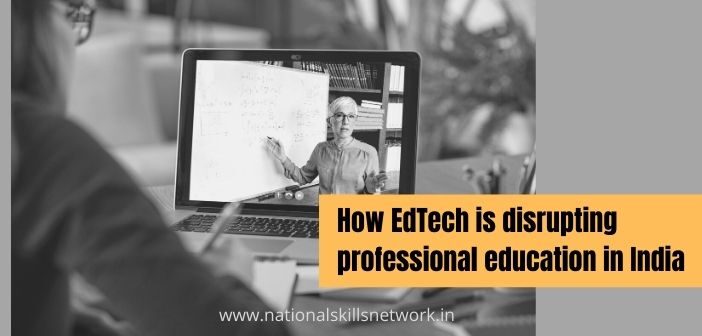
“Just like how demonetization was a game changer for the FinTech industry, Covid-19 is a game changer for the EdTech industry”, says, Dr. Santanu Paul, MD, and CEO, TalentSprint.
During the nationwide lockdown consequential to the sudden outbreak of the Covid-19 pandemic, EdTech companies saw exponential growth in their businesses within a few months. A year later and going forward, industry, academia, and other stakeholders are looking to adopt EdTech solutions not just to teach or train the school or college students but to cater to a larger learners’ base across the world.
Being a pioneer in EdTech, TalentSprint also has a huge presence across the country, as they have built strategic tie-ups with academic institutions and the industry over the years.
To learn more about how the future of the workforce is unfolding, digital disruptions in the pattern of work, current scenario of talent acquisition, we caught up with Dr. Santanu Paul, MD, and CEO, TalentSprint. Read on to know more or you can also watch the video interview on our YouTube channel, for which the link is given below.
Q: Tell us about your highly impactful partnerships with the academia and the industry in how it has contributed to employability?
A: By having productive and fruitful partnerships with industries and academia in general, the blue-chip industry, and top-tier academia in particular, we came to a conclusion about what the youth and working professionals want.
If we look at young professionals seeking their first career break, who are currently in college, while it is exciting for them to learn new technologies, they really want to have industry validation. Most students feel that the big gap in their lives is the industry connect. When they are exposed to the industry, big companies, content from the industry, certificates from the industry, and boot camps in those industries, they feel they are now industry-ready.
On the other side, we have working professionals, who have been working in the industry for 10 or 15 years. The crisis they are looking at is career upskilling and career growth opportunities, to be able to change their current role. Industry professionals are looking for fresh academic rebranding. They want to go back and get an academic certification and at TalentSprint they can get access to this through our programmes like executive education and Deep Tech certification.
Finally, it can be understood that people in colleges love the industry, and people in the industry love colleges.
Q: Covid-19 has accelerated the adoption of technology in education and training. How do you think this has disrupted the pattern of work?
A: Just like how demonetization was a game changer for the FinTech industry, COVID-19 is a game changer for the EdTech industry. In the pre-Covid times, the purpose of our technology platform iPearl.ai was to provide instructors a platform to teach from anywhere in the country and also allow students to learn from anywhere in the country. Therefore, luckily all our programmes switched over to online classrooms without any hitches.
The future of the workforce is going to be a digital! Though the gig was already happening, it will now accelerate. The debate is that future of hiring might be more of automation and less of hiring than before. Today, CEOs of companies are not afraid of automating very heavily. And economics will dictate a more automated world and I think it is already dictating!
Q: How do you see the role of government and foresee technologies like AI, ML, Robotics or 3D printing, Cybersecurity being offered at the basic skilling or entry-level job roles?
A: The government has to play a role where there is low aspirational value but a huge need for the service to proliferate. If you think of the nature of the workforce here as a pyramid:
Top 1-2% of the people are the creators of algorithms. These are the aspirational job sectors, for example, where people have designed the UI for Ola and Uber or any other high-end applications. We call these people innovators, entrepreneurs, etc. These people find a way to fund themselves.
Top 20-30 % of the people are collaborators of algorithms. They know how to use a complex algorithm. For example, Radiologists today don’t look at scanned images, they use AI, where the technology pinpoints them to problem areas. A new professional class like doctors, engineers, lawyers are algorithm collaborators.
The next 60-70 % of the people are the followers of instructions of algorithm. These people just know how to use the algorithms by following the instructions, for example, Uber driver, Swiggy delivery person, etc. This is the non-aspirational job sector. For example, cybersecurity is an area where most people have to follow instructions to understand an algorithm. Wherever we need to follow the instructions from an algorithm, the government can play a big role in proliferating that skill set.

Q: Could you share some information on the recent acquisition of TalentSprint? What is in store for the various training programmes and other initiatives?
A: National Stock Exchange (NSE) of India through its education arm took the majority stake in TalentSprint recently. Why is someone like NSE is interested in this deal is the real question here. What’s in it for NSE? NSE is about running a stock market using technology, it is an automated platform for India’s largest stock exchange.
While the stock markets are technically sophisticated and there are very large stock exchanges by global standards, in reality, a very small fraction of the Indian population today is participating in the stock market in terms of wealth creation. NSE would want to expand the base of people who can invest in the stock market. When more people invest, then the stock business can expand.
Read more from TalentSprint here – https://nationalskillsnetwork.in/talentsprint/
Today, those who are in the workforce or entering the workforce, who are going to get a better paying job would have the resources to invest in the stock market. TalentSprint is one of the key players in helping young people and working professionals increase the income and social standing.
In the future, these people would come into the stock market. NSE’s strategy is the seeding strategy. If they have an EdTech company, you will have a pipeline of people into the stock market. TalentSprint has already locked up partnerships with IITs, IIMs, IISCs, and global partnerships with Google and Pega.
We want to dominate the Indian market in executive education for Deep Tech. We will also do a lot of coding boot camps in partnership with global partners like what we have with Google and Pega. A domestic academic partnership model for working professionals and global partnerships expanding boot camps in India for college students.
Q: Can we have your closing remarks and observations on continuous learning and education.
A: We, in India, are obsessed with ‘what to teach’. Our problem should not be ‘what to teach’, because our curriculum is identical to what is taught in other countries with a 10% of difference. Our problem is ‘how we teach’.
Top universities in the world not just teach, but to help the students build or create something with that knowledge. We should use ‘skilling’ as a verb and not a noun.
At Talentsprint, we focus on ‘what can one build with this knowledge’.
In the coming years, education will get unbundled. It will be about work, course credits, and continuous learning. Since no single institution can have all the expertise, multiple content from multiple universities along with industry experience will be the key.














Comments 1